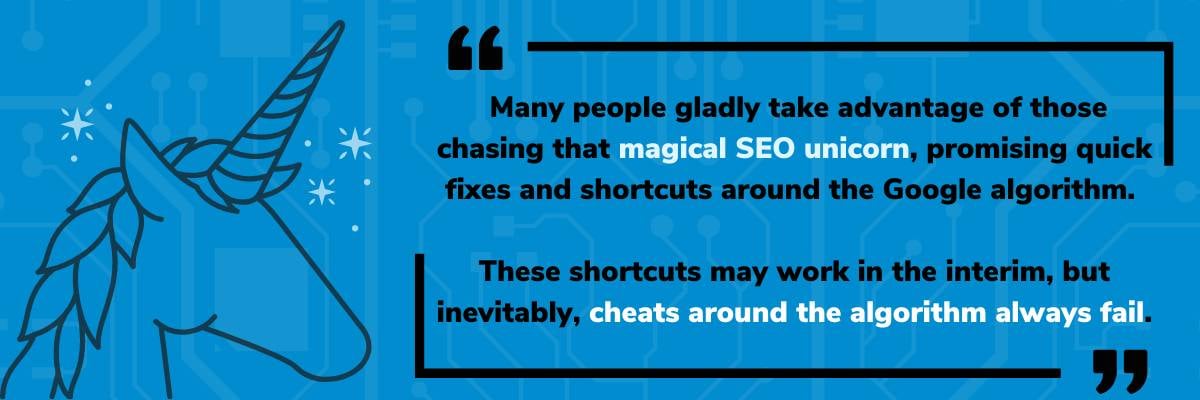Is SEO Worth It in 2023?
February 22, 2023 •Devin Dabney

The short answer to this is “Yes, but only if you do it right.” The long answer is a bit more complicated.
It’s valid to question the worth of an SEO strategy. Search engine optimization has always been a sort of mythical beast in the tech world: spoken of by many, witnessed by few, and understood by even fewer (at least, that’s what some tech professionals claim). What’s worse, many people gladly take advantage of those chasing that magical SEO unicorn, promising quick fixes and shortcuts around the ever-changing Google algorithm. Of course, these cheats may work in the interim, but they always inevitably fail, leaving business in a worse position than they were before. And now, reports of emerging technology put into question the practice of SEO at all. Has AI slain the mythical beast of SEO? Is SEO dead in 2022, forever left in the past with dial-up internet?
No, SEO is not dead. If anything, it’s stronger than ever before—mostly because there’s so much misinformation to sort through before finding good advice around how to do it well. The positive of that, though, is with actual help in understanding how to optimize your content for search engines, you can put yourself in a better position to reach your customers. The future of SEO is bright, and DemandJump is here to help you get there. Let’s develop an SEO strategy for 2023, together. No unicorns, we promise. (Unless you want a literal unicorn.)
Will SEO Be Obsolete in the Future?
No—at least, not anytime soon. When people talk about SEO as “outdated,” what they are actually referring to is bad SEO practices: keyword stuffing, flooding the internet with low-quality content, and copying popular content. Those practices are truly outdated and, in reality, they were never up-to-date in the first place. The difference is that now, search engines are getting better at catching those practices. Google, for example, has made it clear what kind of content they don’t want to promote. Scraped content, machine-generated traffic and link spamming are just some of what Google labels as taboo—all of which fall into the category of bad SEO practices.
Then, what does good SEO practice look like? To answer this, we need to understand what makes SEO challenging to achieve, and why—even with solid comprehension—some companies can’t make it happen.

Why Is SEO So Difficult?
SEO is challenging because it involves multiple facets, working together, in an environment that is constantly evolving. Technology changes, search trends come and go, and things that top the market today won’t necessarily be relevant tomorrow. And when it comes to true search engine optimization, you’re essentially trying to hit four moving targets with one single shot—those four targets being:
- On-Page SEO
- Off-Page SEO
- Technical SEO
- Local SEO
Each of those four targets has different parameters for success, and those parameters are different year to year, or even day to day. Take on-page SEO, for example: a tactic focused on what you put on your web pages. Keywords play a crucial role in on-page optimization, but the “right” keywords are hard to distinguish without the proper technology. Even if you have a good list of keywords you can’t just, well, stuff them onto your page. You have to use them to write content that is not only engaging, but helpful to those searching the keywords. And remember, this is all just one piece of the puzzle that is SEO.
Can AI Replace SEO Content by Humans?
Definitely not—for now, at least. While using AI to keep up with the ever-moving target of SEO seems like a logical choice, it’s a choice that won’t pay off—and for several reasons:
Google Does Not Like (or Want) AI-Generated SEO Content
It’s no secret that Google has not only expressed a dislike for AI content, but has also expressed that they will punish companies that use it for SEO purposes. And if the undisputed top dog of search engines is against something, we’re willing to bet it’s not going to be an effective strategy for any search engine—Google or otherwise.
As AI Improves, So Will AI Detection
It’s true that AI can learn at a blistering rate. While we may be currently poking fun at a chatbot’s poor grammar and lack of writing skills, it will likely be much better next year… but, so will the methods for catching AI text. To illustrate how possible this is, a 22-year-old student at Princeton has already developed a method to detect ChatGPT-generated text. While this isn’t something everyone can do, it shows how quickly technology can be countered with other technology. So while AI can (and will) get better over time, it’s going to be hard for AI to outpace its adversaries. This is especially true when there are people whose job it is to stop AI content from proliferating—including developers of said AI.
AI Content Is neither Original nor Engaging
This, above all else, is why AI can’t be the core part of a strategy for better SEO. Even if you somehow manage to slip AI content past Google or the many detection algorithms, AI content is still a boiled-down mixture of what already exists on the internet. AI bots cannot “write” new thoughts or perspectives. And ultimately, if you cannot provide your audience with something new, informative, or at the very least entertaining, then you will not have an audience.
If you’re not deterred by any other reason, remember that your goal is to write for people, not machines. And bland, regurgitated content does not reach people, nor does it result in conversions.

Reach the Top—and Stay There—With DemandJump
The future of search engine optimization is one where smart, engaging content easily rises to the surface. And at DemandJump, we specialize in using a strong content strategy to give our customers the results they want. Through our Pillar-Based Marketing strategy, we’re able to develop a plan that is not only full of valuable content but driven by real search engine data, pulled via our Consumer Insights Platform. Contact us today and see what our customers already know: that good SEO is alive and well!
Featured Articles
Categories
- Attribution Tracking (13)
- Channel Optimization (11)
- Consumer Insights (68)
- Content Marketing (251)
- Data Science (8)
- Digital Marketing (6)
- Digital Transformation (26)
- Enterprise (10)
- Lead Generation (14)
- Market Intelligence (8)
- Marketing Analytics (39)
- Marketing Attribution (57)
- Marketing Management (153)
- Marketing Operations (86)
- Organic Search (222)
- Paid Search (52)
- Pillar-Based Marketing (63)
- Programmatic Advertising (9)
- SaaS Content (14)
- SaaS Marketing (29)
- Search Marketing (111)
- SEO Keyword Research (28)
- SEO Pillar (18)
- SEO Strategy (46)
- SMB (5)
- Website Content (12)


